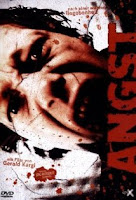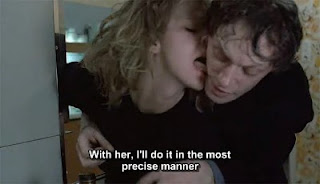Angst
 aka Fear
aka Fear
Austria, 1983
Director: Gerald Kargl
Starring: Erwin Leder, Robert Hunger-Bühler, Silvia Rabenreither
IMDB: 7.7
Generally I am a fan of 'psycho killer' movies. Why? Usually for their black humour (Eg: American Psycho, Edmond) or for great acting (Silence of the Lambs). But also I admit to deriving some measure of perverse glee in watching the average Joe take out his rage on society at large in an uncontrolled release of vented frustration.
I mean, who doesn't travel partway along this road from time to time? Luckily most people have a well-conditioned moral centre, reason, and humanity which when combined with the fear of punishment usually ensures that most of us don't go much further than issuing juicy invective in a non-specific direction.
Which is to say that part of the attraction surely lies in the vicarious thrill engendered through watching films where the chief protagonist, for whatever reason, has no such compulsions holding them back. We can enjoy the movie in full knowledge that we ourselves would never cross this line. It may even be somewhat cathartic. And undoubtedly the enjoyment of such movies can be justified, safe in the knowledge that it's "just a movie" after all.
Angst however, is perhaps not "just a movie" being loosely based on the real-life serial killer Werner Kniesek, who was arrested in 1980 after savagely butchering three people in Salzburg, Austria. Additionally, the film's dialogue is entirely in voice-over, telling us "The Psychopath's" inner feelings as he awaits release from jail the next day, eager to resume his sado-sexual killings at the first opportunity, and then following him as he is released from prison with just one thing on his mind. Much of his dialogue is quoted directly from interviews with real-life serial killers including the Vampire of Dusseldorf, Peter Kürten.




What we have here then, is not the typical glossy Hollywood version of a Psycho Killer, nor a stylised cliche - but an altogether more realistic, and therefore far more disturbing one.
Erwin Leder's portrayal of The Psychopath eschews the smooth, calculating and urbane exteriors of characters such as Hannibal Lecter and Patrick Bateman in favor of a more vile and pitiful characterisation, along similar lines as Ted Levine's turn as Buffalo Bill in Silence of the Lambs. He is shown to be chaotic, paranoid, repulsive, and surprisingly ineffective. Basically, pretty fucked up.
Despite being the central character, he is not one you can identify with or root for. Nonetheless we are forced into his world, and into his head, through the aforementioned voice-over and also through some outstanding camerawork from Zbigniew Rybczynski (pronunciation unknown).
The camera takes a floating position somewhat to the side and above the psychopath, rarely leaving him as we are forced to look downwards and watch as events unfold. At other times the camera is employed in a shaky hand-held style, or situated directly behind the actor's head. Interestingly, during the psychopath's triumphant moments, the camera switches position to floor-level, looking up at him looming large, reflecting the state of his ego.


The final part of the equation is the score provided by noted German composer Klaus Schulze. Taking into consideration that this was 1983, the score is eerily fitting and brings to mind Giorgio Moroder's work on Cat People. Ie: It's easily identifiable as "early 80's" with its droning synth lines. This does however add a specific feel to proceedings that suit the time and place of the movie.
Technically speaking this is an interesting film, but due to its realistic and downbeat nature looks low-budget, despite the creativity employed. But then viewers expecting Pirates of the Caribbean production values aren't likely to track down an obscure Austrian film from 1983!


Knowing in advance that French director Gaspar Noe (Irreversible, Enter the Void) has explicitly named this film as an influence, you will have little trouble seeing why. Noe's trademark swooping camera in Irreversible was distinctly foreshadowed here, as was the almost first-person view he used in "Enter the Void".
Which brings us tidily into another Noe comparison for those who recall the infamous brutal rape of Monica Bellucci in his film Irreversible. Let's just say that Noe's version is the tamer one! It is no wonder that director Gerald Kargl had immense trouble getting the film distributed, and even today it is not easy to find. As one IMDB reviewer put it so well, "It makes The Silence of the Lambs and Seven look like kindergarten stuff."




For fans of true crime, and anyone seeking a more authentic psycho killer experience this surely rates as one of the most successful of its type. It's nasty, it's seedy, it's disturbing - just like the crime itself. What was the film's biggest downfall is also its greatest asset - it's honest. Brutally so.
Rating: 7/10. For horror connoisseurs only.










4 comments:
I wouldn't say the rape in IRREVERSIBLE is tamer than the rape in ANGST. The ANGST rape is certainly gross, but it's not relentless.
Welcome back. It's been too long since the last review on "Twisted Flicks".
I must admit I haven't heard of "Angst" before today, but basing on what you wrote, I'll make sure I see it someday in the, hopefully, near future.
As for Gaspar Noe,I have "Enter the Void" sitting on my list; I'm just waiting for the right mood to finally see it.
@Phantom. True enough, Irreversible is more excruciating, but Angst is certainly sicker.
@Shaft - yeah I hadn't heard of it myself until I heard Gaspar Noe name drop it in an interview. Seems to be fairly unknown. Re: Enter the Void, will be interesting to hear your thoughts! No doubt its a polarising movie. Either it resonates with you or it doesn't.
great,rare ,movie...
...It's nasty, it's seedy, it's disturbing...
Post a Comment